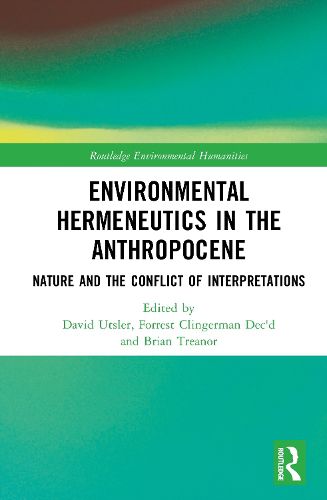Readings Newsletter
Become a Readings Member to make your shopping experience even easier.
Sign in or sign up for free!
You’re not far away from qualifying for FREE standard shipping within Australia
You’ve qualified for FREE standard shipping within Australia
The cart is loading…






Environmental Hermeneutics in the Anthropocene is a diverse collection of essays that approach contemporary environmental problems with the tools and perspectives provided by the tradition of philosophical hermeneutics, advanced by philosophers such as Martin Heidegger, Hans-Georg Gadamer, and Paul Ricoeur. Engaging both established and new voices, this book presents a significant contribution to the field by expanding the scope of philosophical hermeneutics to environmental issues. It addresses a broad scope of environmental topics such as the Anthropocene, climate change, degrowth, environmental justice, the limits of language in understanding nature, and environmental aesthetics in environmental practice. Together, the chapters show the crisis of regional and global environmental problems to be in part a crisis of interpretation. The ways that human beings understand their relationship to environments shape and determine how to act and live within places. Yet the values and ideals that different people have about their lived environments often come into conflict. Thus hermeneutics plays an important role in environmental discourse: it helps adjudicate these conflicting understandings. This collection of essays demonstrates the unique way that environmental hermeneutics can be employed to understand environments in this age of the Anthropocene. It will appeal to researchers and upper-level students in environmental humanities, environmental studies, ethics and philosophy.
$9.00 standard shipping within Australia
FREE standard shipping within Australia for orders over $100.00
Express & International shipping calculated at checkout
Environmental Hermeneutics in the Anthropocene is a diverse collection of essays that approach contemporary environmental problems with the tools and perspectives provided by the tradition of philosophical hermeneutics, advanced by philosophers such as Martin Heidegger, Hans-Georg Gadamer, and Paul Ricoeur. Engaging both established and new voices, this book presents a significant contribution to the field by expanding the scope of philosophical hermeneutics to environmental issues. It addresses a broad scope of environmental topics such as the Anthropocene, climate change, degrowth, environmental justice, the limits of language in understanding nature, and environmental aesthetics in environmental practice. Together, the chapters show the crisis of regional and global environmental problems to be in part a crisis of interpretation. The ways that human beings understand their relationship to environments shape and determine how to act and live within places. Yet the values and ideals that different people have about their lived environments often come into conflict. Thus hermeneutics plays an important role in environmental discourse: it helps adjudicate these conflicting understandings. This collection of essays demonstrates the unique way that environmental hermeneutics can be employed to understand environments in this age of the Anthropocene. It will appeal to researchers and upper-level students in environmental humanities, environmental studies, ethics and philosophy.